Yatra Development Cost in 2025: Complete Cost Guide & Breakdown
Create a powerful, customizable streaming solution with Miracuves’ Yatra Clone, equipped with high-performance features and next-gen technology.
If you’re looking to create a Yatra app, which is essentially a travel booking platform for flights, hotels, and other services, you’re about to tap into a booming market. But before diving into designing features, choosing technologies, or planning your user experience, one question stands out: What’s the cost to develop a Yatra app?
Whether you’re a fintech entrepreneur, a startup founder, or someone keen to enter the travel industry, understanding the costs involved in developing a Yatra app is crucial. Knowing the total development cost not only helps with budgeting but also sets realistic expectations for the entire project. The costs can vary depending on several factors like complexity, features, region, and the development team you choose.
In this guide, we’ll break down the real costs behind developing a Yatra app, the key factors that influence these costs, and how you can optimize your budget without sacrificing quality. Let’s dive into the details to give you a clear picture of what you’re investing in when building your travel platform.
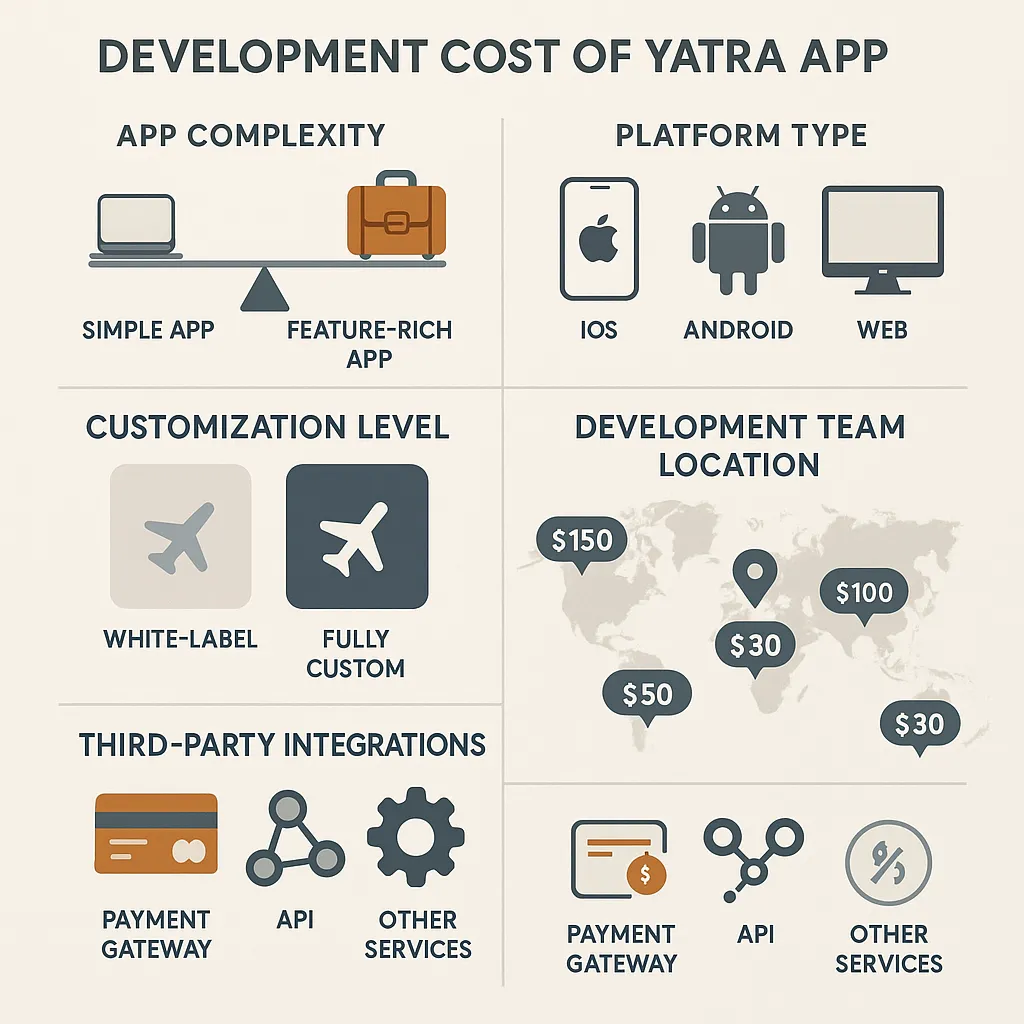
Key Factors That Influence Development Cost
The cost of developing a Yatra app isn’t fixed. Several factors influence how much you’ll end up spending, and understanding these factors helps you make more informed decisions when planning your app. Let’s explore the major cost drivers:
App Complexity
The complexity of your app is one of the most significant cost drivers. If you opt for a basic Yatra app with core features like flight and hotel bookings, it will cost significantly less than a more advanced version with functionalities such as real-time updates, user personalization, multi-currency support, and integrated payment gateways. The more sophisticated the features, the higher the development cost.Platform Type
Are you planning to build your Yatra app for Android, iOS, or both? Developing an app for multiple platforms increases the cost due to the additional time and resources required for designing, coding, and testing across various operating systems. The development team needs to ensure that the app works seamlessly across all platforms, which can significantly increase the budget.Customization Level
While white-label Yatra clone apps are more affordable, they come with limitations in terms of customization. If you want to build a fully custom app that stands out in the market with unique features, the cost will increase. Customization requires more design work, development effort, and time to implement, making it more expensive than using pre-built templates.Development Team Location
The location of the development team plays a critical role in determining the cost. Hiring developers in North America or Western Europe can be expensive, with hourly rates ranging from $100 to $180 or more. In contrast, outsourcing to countries like India or Eastern Europe can save you money, with hourly rates starting as low as $25 to $50, without compromising the quality of the final product.Third-party Integrations
Many features in a Yatra app, such as flight and hotel bookings, real-time notifications, payment gateways, and maps, require integration with third-party services. These integrations come with additional setup and subscription costs, which can quickly add up depending on how many services you need to integrate into your app.
By understanding how each of these factors influences the overall cost, you can better estimate your budget and avoid unexpected expenses as you move forward with your project.
Yatra App Development Cost by App Complexity
|
Type
|
Features
|
Estimated Cost (USD)
|
|---|---|---|
|
MVP (Minimum Viable Product)
|
Basic booking features, user account creation, search and filter options for flights and hotels
|
$30,000 – $60,000
|
|
Mid-level App
|
Integration with flight and hotel APIs, payment gateways, push notifications, reviews, and real-time updates
|
$60,000 – $120,000
|
|
Full-Scale Neobank
|
Advanced features like multi-currency support, personalized user experience, geo-location services, multi-platform support (iOS, Android, Web), admin dashboard
|
$120,000 – $250,000+
|
These estimates cover the core development process, including design, coding, quality assurance testing, and basic post-launch support. However, they do not account for other critical expenses such as licensing, ongoing maintenance, marketing, or infrastructure costs.
A Minimum Viable Product (MVP) focuses on delivering the essential features, allowing you to enter the market quickly and get user feedback. This version is ideal for testing the concept before committing to a larger investment.
A mid-level app introduces additional features like real-time booking updates, reviews, and enhanced user experience components. It’s more scalable, but still not as complex as a full-scale app.
A full-scale app is a comprehensive solution that supports multi-currency, advanced analytics, personalized recommendations, and integrates seamlessly across platforms (iOS, Android, and Web). It’s a sophisticated version designed to compete in a competitive market, with a higher cost attached.
Understanding these distinctions will help you choose the right development approach and align your budget with your project goals.
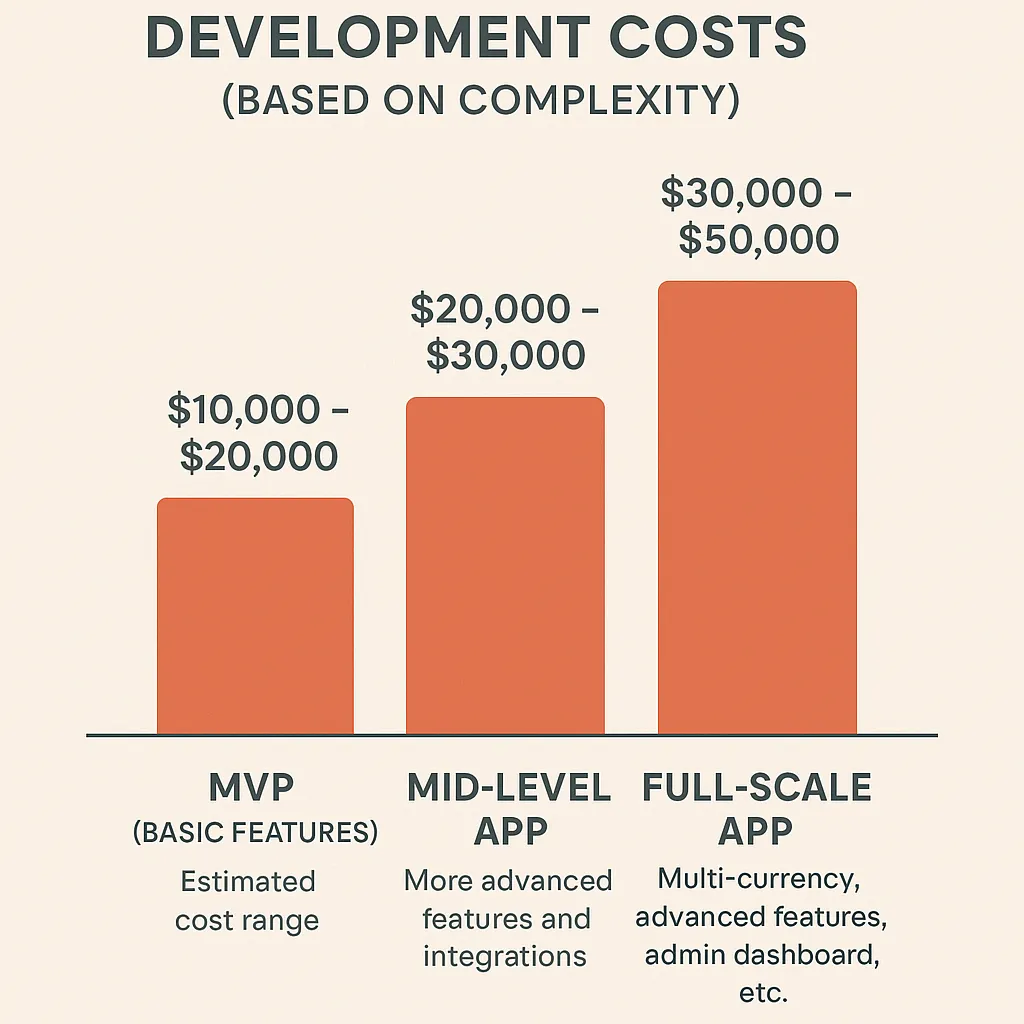
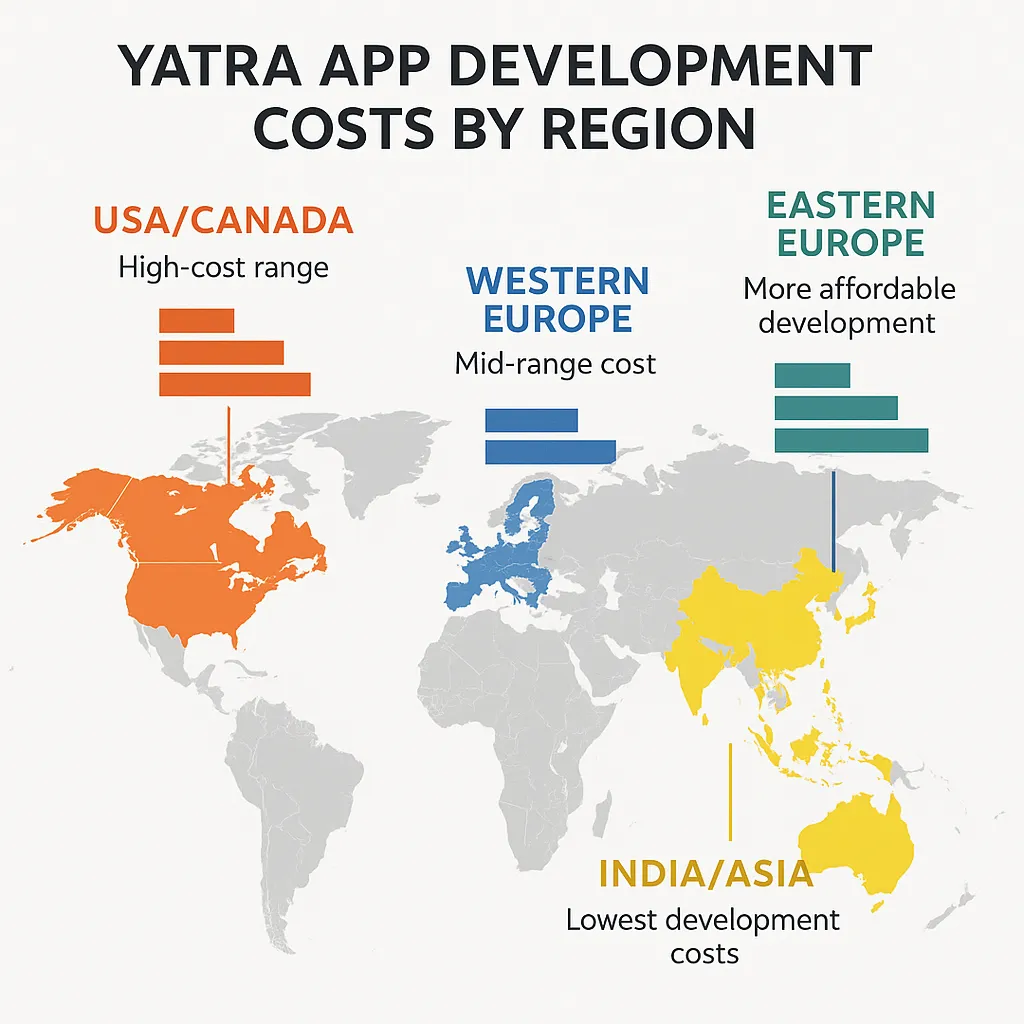
Yatra App Development Cost by Region
The region where you choose to hire your development team can have a significant impact on your overall app development cost. Different regions have varying hourly rates for developers, and these rates will affect the total cost of building your Yatra app. Here’s a general comparison of how development costs vary by region:
|
Region
|
Avg Hourly Rate
|
MVP Cost
|
Full App Cost
|
|---|---|---|---|
|
USA/Canada
|
$100 – $180
|
$100K+
|
$250K – $500K
|
|
Western Europe
|
$80 – $130
|
$80K+
|
$200K – $400K
|
|
Eastern Europe
|
$40 – $70
|
$45K+
|
$120K – $250K
|
|
India / Asia
|
$25 – $50
|
$30K+
|
$90K – $200K
|
USA/Canada
In North America, the cost is typically higher due to the high demand for skilled developers and the cost of living. For a Yatra app, the MVP could start at around $100,000, and the total cost for a full-featured app could reach up to $500,000. However, the advantage is that you’ll likely get a highly experienced team with a deep understanding of global markets and trends.
Western Europe
In Western Europe, the cost tends to be somewhat lower than in North America but still relatively high. For an MVP, you can expect to pay around $80,000+, with the full app costing between $200,000 and $400,000. Countries like Germany, the UK, and France are known for their strong tech industries, so quality can still be on par with North America.
Eastern Europe
Eastern European countries like Poland, Ukraine, and Romania offer a good balance between cost and quality. With hourly rates ranging from $40 to $70, outsourcing to Eastern Europe can be a cost-effective option for building your Yatra app. For an MVP, the cost might be around $45,000+, while the full app could range from $120,000 to $250,000.
India/Asia
India and other Asian countries are known for their affordable development rates, with hourly rates starting as low as $25 to $50. This makes them a popular choice for startups looking to build high-quality apps on a budget. The cost for an MVP might be around $30,000+, and a fully featured Yatra app can range from $90,000 to $200,000. While the rates are lower, it’s important to choose a development team with solid experience to ensure the final product meets your quality standards.
Outsourcing development to regions like Eastern Europe or India can help you save significantly without sacrificing the quality of the final product, provided you choose the right development partner. Make sure to evaluate their experience and portfolio to ensure you’re getting the best value for your investment.
Hidden Costs You Should Plan For
While you’re budgeting for your Yatra app, it’s important to account for the expenses that might not be immediately obvious. These hidden costs can add up and affect your overall budget if you’re not prepared. Here are some crucial additional costs you need to factor in:
Regulatory and Legal Fees
If you’re operating in multiple countries or dealing with sensitive user data, you’ll need to ensure your app complies with local regulations, which often requires legal assistance. Costs for acquiring travel licenses, privacy policy drafting, and legal consultations can quickly add up. Depending on your target markets, regulatory fees can range from a few thousand to tens of thousands of dollars.Third-Party Service Fees
A Yatra app integrates with a variety of third-party services, such as payment gateways, flight and hotel APIs, GPS and geolocation services, and SMS/email notification services. Each of these services comes with setup fees and ongoing subscription costs. For instance, payment gateways usually charge a percentage per transaction, while flight and hotel API providers may charge a fixed monthly fee.Cloud Hosting and Infrastructure
Whether you’re using AWS, Google Cloud, or another platform, cloud hosting costs can grow over time based on your app’s usage. If you have a lot of users making bookings or accessing data, these costs can scale quickly. It’s important to plan for long-term cloud infrastructure expenses, which could range from a few hundred to thousands of dollars monthly, depending on your app’s size and traffic.Security Audits and Certifications
Ensuring the security of user data is crucial, especially in the travel industry where sensitive information is being handled. Security audits, penetration testing, and obtaining certifications like PCI DSS (for handling payments securely) are essential for safeguarding your app and maintaining user trust. These processes can be costly, with audits alone potentially costing several thousand dollars.Maintenance and Updates
Once your Yatra app is live, there will be ongoing costs for maintenance, bug fixes, and updates. These are necessary to ensure the app stays functional, secure, and aligned with evolving regulations or user needs. Maintenance can cost anywhere from 10% to 20% of the initial development cost annually, so it’s important to factor this into your long-term budget.Marketing and User Acquisition
After developing the app, you’ll need to allocate a budget for marketing and user acquisition. Costs for influencer partnerships, paid ads, search engine optimization (SEO), and social media campaigns can add up quickly. You’ll want to spend enough to ensure that your app gains traction, which could range from a few thousand dollars for small-scale campaigns to much more for global outreach.
Accounting for these hidden costs from the beginning helps ensure you don’t run into financial surprises later in your project. By incorporating them into your budget, you can avoid delays and setbacks as you move from development to launch and beyond.
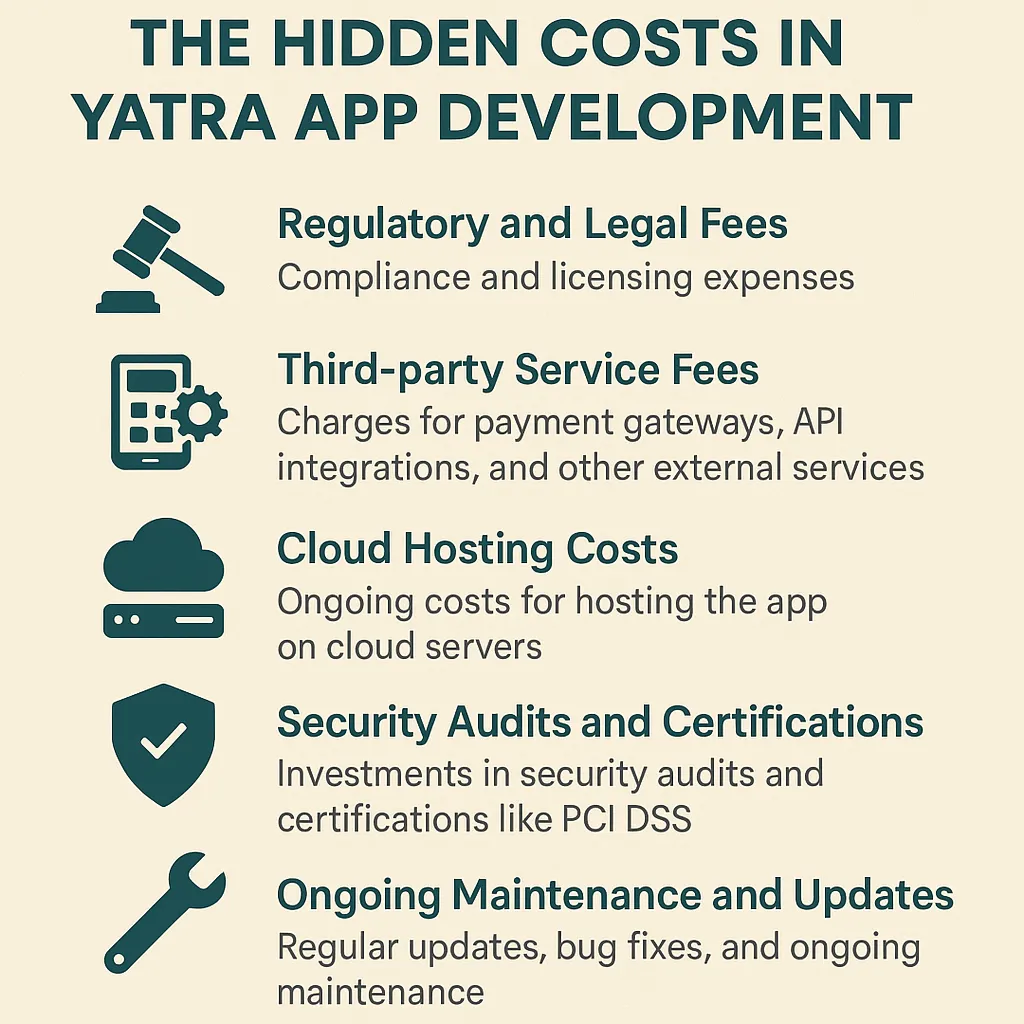
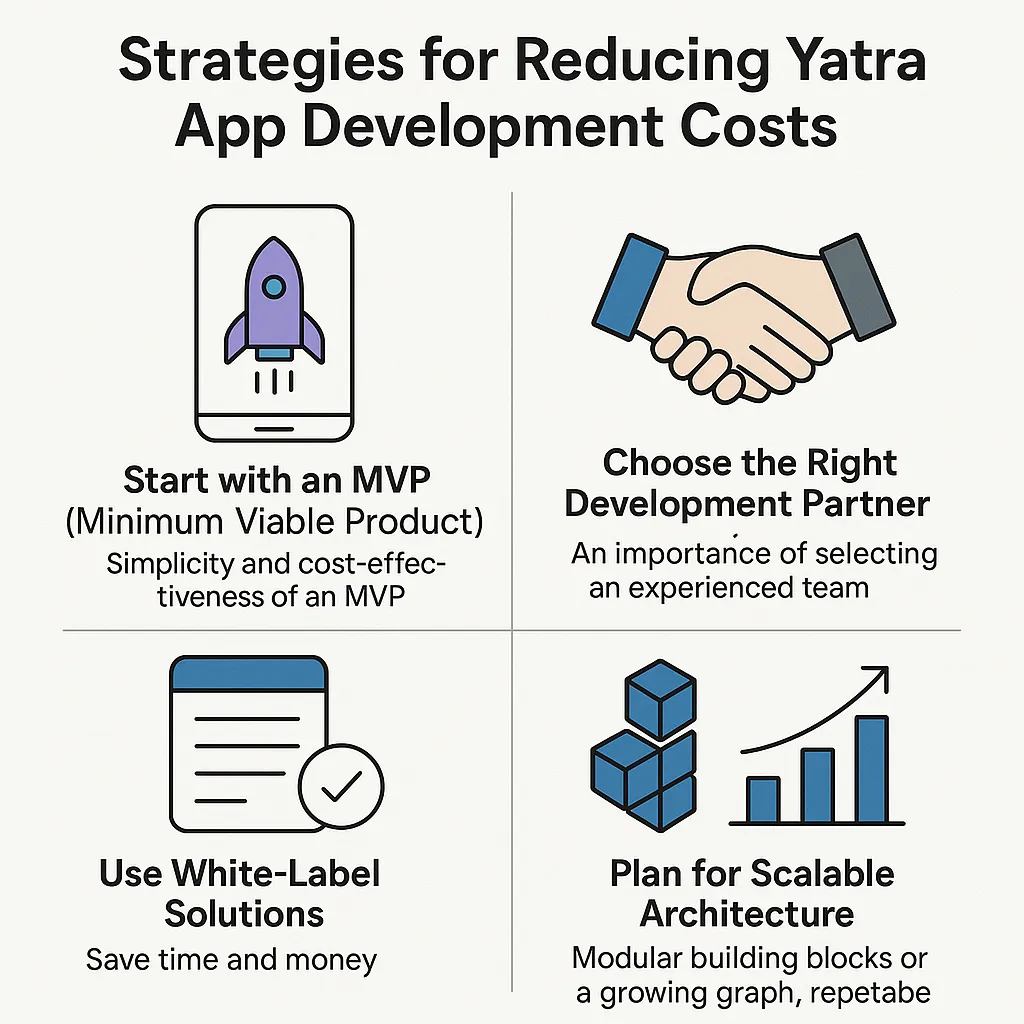
How to Reduce Yatra App Development Costs (Without Compromising Quality)
While developing a Yatra app requires a solid investment, there are strategic ways to keep your costs in check without compromising on quality. Here are some practical tips for optimizing your budget:
Start with an MVP
One of the best ways to reduce costs is by starting with a Minimum Viable Product (MVP). An MVP includes only the essential features needed for your app to function. This allows you to launch quickly, get real feedback from users, and make data-driven decisions about which features to add next. By focusing on core functionality at first, you can save money and time in the early stages of development.Choose the Right Development Partner
Selecting an experienced development team that specializes in travel apps can make a big difference in both cost and quality. When you work with a skilled partner, you can avoid costly mistakes and delays that may arise from inexperienced teams. Look for companies with a proven track record of developing travel or booking platforms and one that offers end-to-end services, from planning to post-launch support.Leverage White-Label or Clone Solutions
If you’re on a tight budget, consider using a white-label or Yatra clone app solution. These ready-made platforms can significantly cut down on development time and costs. While you’ll have less flexibility compared to a fully custom-built app, it’s a great option for entrepreneurs looking to get a functional app to market quickly without a hefty price tag.Use BaaS (Banking-as-a-Service) or Travel APIs
Instead of building everything from scratch, you can integrate third-party services like BaaS platforms for financial services or existing travel APIs for flight and hotel bookings. These platforms handle the backend infrastructure, compliance, and transaction management, saving you the cost of building complex systems yourself. Using proven APIs helps ensure reliability and speed up development.Plan for Future Scalability
Building a modular app architecture is key to keeping costs down in the long run. Instead of building a large, complex system upfront, create an app that can scale as needed. This means designing it in such a way that you can add features and services incrementally as your user base grows, without needing a complete overhaul. This approach helps you avoid spending money on features that may not be necessary at launch.Outsource Smartly
Outsourcing development to regions with lower labor costs, like Eastern Europe or India, can significantly reduce your budget without sacrificing quality. The key is to find experienced developers who understand your business goals and can deliver on your requirements. A well-chosen offshore team can provide a great balance of cost-efficiency and quality.Focus on User Feedback Before Scaling
By gathering user feedback early through beta testing or soft launches, you can make more informed decisions about the features that will actually add value to your users. This helps you avoid spending money on features that might not resonate with your target audience. Prioritize what users truly want and build based on real-world feedback, rather than assumptions.
By employing these strategies, you can reduce unnecessary costs while ensuring your Yatra app meets the high standards of usability, security, and performance. This approach allows you to stay within your budget and scale your app efficiently over time.
Choose the Right Development Partner
Even with a clear vision, launching a travel booking platform like a Yatra app is a significant step — and choosing the right team is crucial. A skilled development partner isn’t just a service provider; they’re your long-term ally in building a secure, scalable, and user-friendly travel app.
When evaluating the best Yatra app clone development company, here’s what to look for:
Proven experience in travel and booking app development
A strong track record of successful travel platforms and booking systems
Comprehensive services — from planning to payment gateway integration, and post-launch support
At Miracuves, we don’t just build apps — we craft solutions tailored for performance, user experience, and growth. Whether you’re targeting frequent travelers, young explorers, or niche markets, we help you launch faster and smarter with our customized Yatra app clone solutions.
Let us handle the development, so you can focus on scaling your travel business.
Conclusion
The cost to develop a Yatra app in 2025 depends on your goals, features, region, and how you build. From $30,000 MVPs to $250,000+ full-scale platforms, the price range is significant — but with the right strategy, you can launch a powerful travel booking platform without exceeding your budget.
Ready to bring your Yatra app vision to life?
Contact Miracuves today for a personalized cost estimate and development roadmap.
For more insights into building, monetization models, or marketing your Yatra app, explore the rest of our clone app series.
Frequently Asked Questions
The cost to develop a Yatra app varies depending on factors like app complexity, features, the development team’s location, and the platform you choose. On average, an MVP (Minimum Viable Product) might cost between $30,000 and $60,000, while a fully-featured Yatra app could range from $120,000 to $250,000 or more.
Yes, using a Yatra clone or white-label solution is a cost-effective way to get started. These pre-built apps can significantly reduce development time and expenses while providing you with essential features. However, they offer limited customization compared to a fully custom-built app.
The timeline to develop a Yatra app depends on its complexity. An MVP can take around 2–4 months, while a fully-featured app with advanced functionalities may take 6–12 months or longer to complete, including testing and post-launch support.
Yes, outsourcing to regions with lower labor costs, such as Eastern Europe or India, can help reduce your development expenses without compromising on quality. Just make sure to choose a development team with experience in building travel apps and a strong track record.
After your Yatra app is launched, you’ll need to budget for maintenance, updates, security audits, third-party service subscriptions, cloud hosting, and marketing. These ongoing costs typically range from 10% to 20% of the initial development cost annually. Additionally, regulatory compliance updates and user acquisition efforts can add to your long-term budget.



